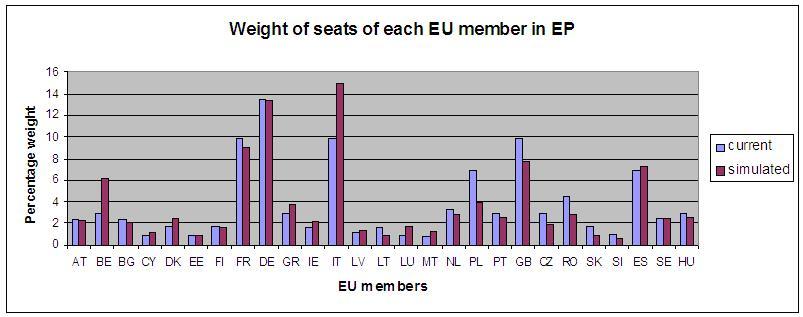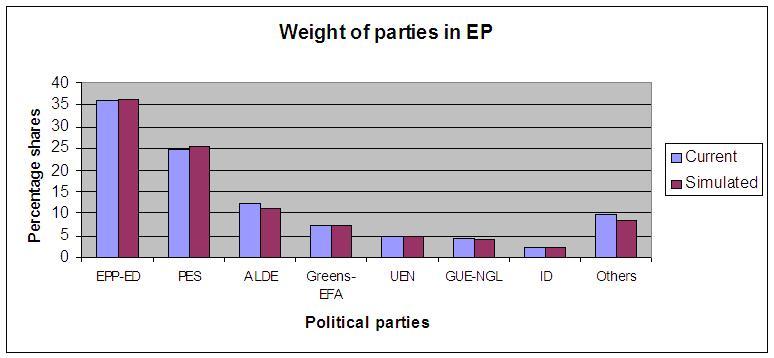The more you vote, the more you count in Europe
Want to encourage higher voter turnout in European Parliament elections? This column proposes allocating seats to member countries in proportion to their voter participation.
Search the site
Want to encourage higher voter turnout in European Parliament elections? This column proposes allocating seats to member countries in proportion to their voter participation.
The European Parliament elections are one of the few occasions for 375 million voters to discuss major issues on the future of Europe and its integration process. However, in almost all countries these issues have been absent from or marginal in the political debate, and the European elections have been mainly used as an indicator of approval or disapproval of the incumbent national governments. The widespread feeling of disaffection for the European elections has produced a drastic decline in turnout: from 63% in the first elections in 1979 down to 45.6% in 2004 and 43.1% this June.
Member of the European Parliament (MEP) Andrew Duff recently put forward a proposal, currently being discussed in the Institutional Affairs Committee of the European Parliament, aimed at encouraging participation by all EU citizens in the electoral process. In this context, we would like to discuss a proposal firstly presented (in Italian) immediately after the 2004 European elections in lavoce.info and recently re-launched there. In a nutshell, we suggest a system of supra-national allocation of seats that rewards countries with a higher turnout rate.
The existing electoral system of the European Parliament allocates seats to member countries more or less in proportion to their populations. As such, MEPs were elected for Malta, with a population just over 400,000 inhabitants, 72 for Italy, France and the UK, up to 99 for Germany, with over 82 million inhabitants. Our idea is that this number of seats should be fully allocated to the member country only if the turnout in the European elections in that country exceeds a certain threshold, for example 90%, which is the percentage historically reached in countries like Belgium or Luxembourg where a compulsory vote scheme is in place.
In all cases in which turnout is lower than 90%, we suggest a mechanism that allocates the number of seats in proportion to the turnout. For instance, if in Italy only 45% of eligible voters had voted, only 36 seats, rather than the 72 potentially assignable, would have been allocated. Consequently, the European Parliament would have a total number of seats varying according to the turnout in the different European countries. In what follows, we provide a simulation of seats for the European Parliament under the proposed system, using the official data on turnout and votes for the national parties in the European elections that took place on the 4-7 June 2009, and compare in Figure 1 the actual with the simulated outcome.
Figure 1. Weight of seats of each EU member in European Parliament

The analysis suggests that the total number of MEPs would drop from 736 to 356, and that countries such as Italy, Belgium, and Luxembourg and, to a lesser extent, Spain, Greece, and Denmark would be rewarded with a larger number. For instance, while France and the UK would obtain, respectively, 32 and 27, Italy would gain 53 seats.
Figure 2. Weight of parties in European Parliament

Figure 2 shows the results of our simulations for the distribution of seats of different political groups under the described mechanism. To date there are 72 MEPs who have not yet chosen which political group to join and are therefore currently left in the residual group “Others”. A substantial part of this political group consists of national parties taking up office for the first time which are often politically oriented towards nationalistic, populist, and euro-sceptical positions. The remaining part of this residual group belongs to the British Conservative Party, which has not yet decided which group to join. In our simulations, we have allocated the Italian Democratic Party to the socialist PES group, since they announced the intention to join it, although it has not yet been formalised by official data.
As it can be seen from Figure 2, the mechanism only marginally alters the relative strength of different political groups, in contrast to what happens to the political weights of each country. There is a marginal decrease in the weights of the radical leftist GUE/NGL and the anti-European parties ID, and a marginal increase of the popular EPP-ED and the Greens-EFA. Slightly more significant changes impact the PES, with the analysis indicating an increase on its share, the Liberal Democrats ALDE and the group Others, that see their share of MEPs decreasing. If this mechanism were already at work, the weight of the more populist, euro-sceptical or openly xenophobic movements in the new European Parliament, gathered under the groups ID and Others, would be weakened only marginally.
Conclusions
A system where bonus seats are given to nations that vote more could appear in many forms. For example, one system could guarantee each country a minimum number of MEPs regardless of turnout, but a bonus system would have the following advantages:
These benefits could then help to bring the European institutions closer to the citizens and therefore more locally accountable in line with the envisaged goals of the Lisbon Treaty.
105 Reads